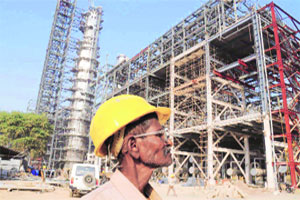Punjab sets off on a hydrocarbon revolution
The Rs 19,000-crore refinery involves a 49 per cent stake for Mittal Energy Limited

In a year where the politics ahead of an election dominated most of the key events in Punjab,the state has also reached an industrial landmark by setting up its first refinery,and a mega one at that.
The Guru Gobind Singh Refinery in Bathinda this month sent its first commercial supplies to Hindustan Petroleum. It was a consignment of kerosene but the refinerys eventual output will include 8mn tonnes of a variety of petroleum products,including 4mn tonnes diesel and 1mn tonnes petrol a year,all of it environment-friendly,and which will address much of the demand not only in Punjab but elsewhere in northern India.
monthly limit of free stories.
with an Express account.
The Rs 19,000-crore refinery,the single largest investment in any project in Punjab,involves a 49 per cent stake for Mittal Energy Limited,besides 49 per cent for HPCL. It was processing crude on trial since August,with most of its 35 units commissioned,before sending its first commercial consignment.
The project includes a 1,016-km pipeline. From Mundra in Gujarat,crude oil sourced from docked vessels is put into the pipeline and sent to Phulokhari near Bathinda,with an elaborate security system monitoring every inch of the distance.
Officials say 60 per cent of the processed products will be transported by pipeline to the HPCL terminal in Bathinda and to the Bahadurgarh terminal near Delhi,another 30 per cent by railway and the remaining 10 per cent by truck.
The project is expected to set Punjab on a hydrocarbon revolution to address its energy needs. The refinery will change the socio-economic landscape of Bathinda region, says M A Tankiwala,chief operating officer of GGSR.
The project has enabled a great deal of infrastructure development including new roads,electric supply and other logistic connectivity, Tankiwala said. It will raise the economic index of the state. It has attracted the best talent pool from across 102 companies of the world in the hydrocarbon industry to this region.
The refinerys products will include motor spirit,high speed diesel,superior kerosene oil,aviation turbine fuel,LPG,naphtha,pet coke,sulphur,hexane,mineral turpentine oil and polypropylene. This has set the stage for a potential downstream,polypropylene-based plastic and packaging industry that will include manufacturing of helmets,laptop covers,car bumpers,films and sacks.
Spread over 2,000 acres,the project includes a township for employees. Line walkers and CCTV cameras monitor the pipeline that runs 2 m underground,27 sectionalised valve stations and intermediate pumping station. The security setup includes also a face reader and vehicle scanners that one must pass to gain entry.
The 100-odd line walkers from end to end,each equipped with GPS facilities,walks 8 km and back every day,all the time visible from the control room. If they go too far off course,the monitor detects that and they are directed back. Many layers of a special chemical insulate the pipeline from theft.
CCTVs monitor the sectionalised valve stations,intermediate pumping station and the crude oil terminal in Mundra. The boundary wall is electronically fenced,with a system in place to pick out any climber. The security staff have a dog squad of 16; the refinery will be declared a no-flying zone.
Security is foolproof and totally technology-driven, said Col Arun Sindhwani (retd),general manager for security.
The control room also monitors the pressure of flow,so that any fluctuations can be corrected.
The GGSR has signed memorandums of understanding with JP Cements,ACC Cements andShree Cements for supplying pet coke,which will be one of the refinerys byproducts. Pet coke,the solid residue from the distillation of petroleum material,has more than twice the calorific value of coal and is widely used as an alternative to coal in power plants,cement kilns and blast furnaces.
MoUs have also been signed with Punjab Spintex Ltd and Northern Poly Films for supply of polypropylene. Another 12 MoUs have been signed with sugar mills in the northern region for other products.
The refinery has a 160MW power plant of its own. The refinery is a zero bottom plant where all formalities related to liquid and solid waste management have been complied with, Tankiwala said. A green belt has been developed around the refinery. All person joining here have to undergo and pass training.